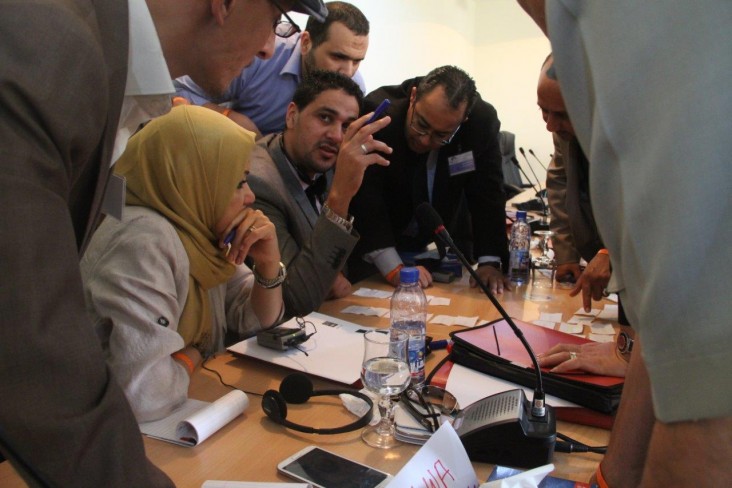Speeches Shim

Project Title: Supporting Consensus Building for the National Dialogue, Constitution Drafting & Governing Process in Libya
Duration: August 2014 – August 2019
Objective:
Provide support to Libyans as they make important decisions about the structure, authority, power, and resources of their national and local governments and the treatment of and protections for their citizens. A key component of this project is to engage citizens, including marginalized groups, in the national dialogue to compile community perspectives and to build consensus on important issues that will influence the constitutional reform process, and lay the groundwork for a more engaged citizenry.
PROGRAM ACTIVITIES
- Work with stakeholder groups and informed citizens to develop consensus on key constitution issues and effectively inform the constitution drafting body.
- Support community engagement, public outreach, and education on the constitution, peace building, and effective local governance. Train volunteer community liaisons who conduct dialogues with diverse community members on matters relating to Libya’s transition.
- Provide technical support to the Ministry of Local Government and local municipal councils to strengthen local governance.
- Once the constitution is developed and the referendum passed, support consensus processes through local organizations that will incorporate outputs from the national and regional dialogues towards a democratic political transition.
- Utilizing a rapid response mechanism, the program will conduct a judicial baseline assessment, outline reform priorities, and offer technical assistance in targeted areas to promote judicial efficiency, accountability, independence, and effectiveness of the Libyan justice sector.
Program Status/Achievements:
The LCB program:
- Enabled a group of independent members of the Libyan Political Dialogue to positively influence negotiations over a future national government.
- Provided technical training to Libyan journalists and socialmedia activists and facilitated engagement with dialogue actors.
- Convened Libyan legal experts to address constitutional formulations on decentralization and advise the drafters.
- Held workshops on national vision, dialogue, and action with ‘Moderate Middle’ leaders, youth activists, and women; 74 out of a total of 203 recommendations were reflected in the draft consitution.
- Supported 61 community dialogue sessions since late 2015 in 34 communities.
- Trained the Constitution Drafting Assembly in engaging stakeholder communities and the media; developed a primer on the constitution.
- Launched a targeted nationwide mobile phone SMS outreach system to raise awareness about the constitution.

Comment
Make a general inquiry or suggest an improvement.